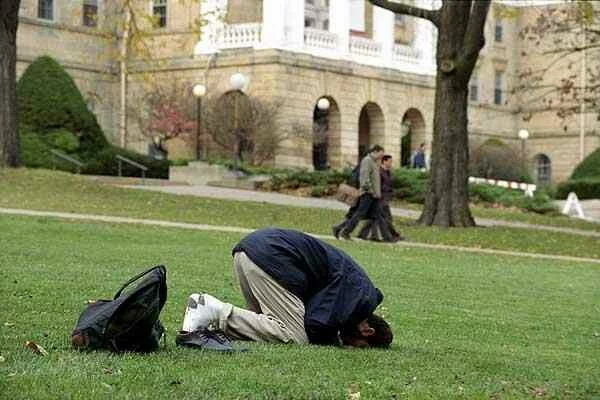Assess your mental readiness for Prayer before its commencement, during the various postures with its attendant recitations, after each rakah (unit of prayer) and ultimately, at the end. Try to make improvements at each stage.
Pray with humility both in your mental state and in your physical manner. Pray with hope and awe, asking Allah for His mercy and forgiveness.
Remind yourself continually that you are talking to the most important ‘Being’ in your life: your Creator and Sustainer.
He is in front of you. You are facing Him and you are involved in a dialogue with Him. Commence your Prayer by seeking Allah’s help and protection from the influences of Satan. Lower your gaze while praying and do not allow the physical environment to distract you.
Prophet Muhammad said to his Companion, Anas:
“My dear son, be sure to avoid being distracted during Prayer, for, to become distracted while praying is a disaster.” (At-Tirmidhi, 246)
Use a variety of Quranic verses and du’a in your Prayer to achieve greater concentration and awareness.
Adopt a whispering technique in your recitation. This will increase your ability to remain focused on what you are saying. As you recite the Quran, translate it in your mind into your own language so that your attention is held.
As you concentrate upon the meaning and implications of the words, all thoughts of worldly ideas will disappear.
On each occasion that you recite the attributes of Allah in leaning and prostration, consider how indebted you are and how grateful you should be to Allah and express your true emotions.
tilize the occasion of prostration to make additional du’a to Allah.
Prophet Muhammad said:
“A servant is nearest to his Lord when he is prostrating, so increase your supplication when in prostration.” (Muslim, 482)
Make your prayer of moderate duration, so that you do not become physically and mentally tired. But be aware that while in prayer, you must take your time praying.
Give due regard to the proper performance of all the physical postures.
Pray as if it is your last Prayer. Prophet Muhammad said:
“When you stand up to pray, perform your prayer as if it were your last, do not say anything you will have to make excuses for tomorrow, and resolve to place no hope in what is in the hands of men.” (Ibn Majah, 4171)
Performing your Prayer in a satisfactory manner should lead to a radical change in the way you lead your daily life. Allah says in the Quran what means:
{Surely, Prayer prevents indecency and evil} (29:45)
Your improved and more disciplined life will, in turn, help the quality of your Prayer to increase even more. The two should feed one another and continuously reinforce each other.
Note that there is punishment for a Prayer not performed satisfactorily. It will be a witness against you rather than a witness for you on the Day of Judgment.
However, the reward for a Prayer well performed is immeasurable. Prophet Muhammad said:
“If a man performs two units of prayer without the distraction of any worldly thought, all his previous sins will be forgiven.” (Al-Bukhari, 159)
Late Night Prayers
Even though it is not obligatory, try to establish late night prayers as part of your nightly activities. Prophet Muhammad said:
“The best Prayer after the obligatory prayer is the night Prayer.” (Muslim, 256)
One of the characteristics of servants of the Most Merciful is that they get up at night and perform late night Prayers. Night vigil is a source of great spiritual energy. Prophet Muhammad has said:
“When a man wakes up his wife at night and they pray two rak’as (units) together, they are written down among the men and women who remember Allah.” (Ibn Majah, 1335)
The Quran also commends the one who utilizes the early hours of each day to engage in remembrance of Allah:
{Is one who worships devoutly during the hours of the night prostrating himself or standing [in adoration] and who places his hope in the mercy of His Lord [like one who does not]? Say are those equal: those who know, and those who do not know? It is those who are endowed with understanding that receive admonition.} (39:9)
 Muslim Blog Muslim Blog
Muslim Blog Muslim Blog






